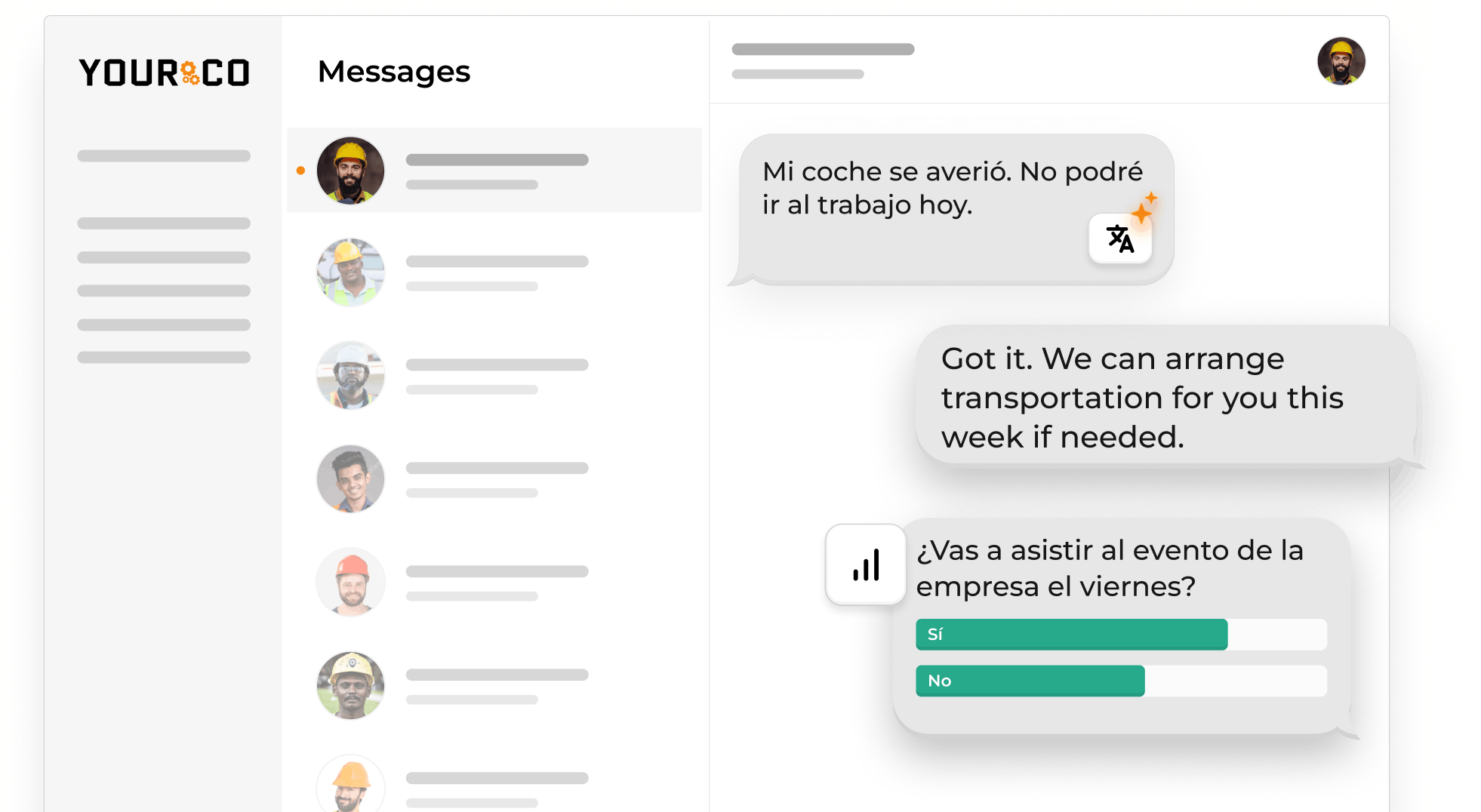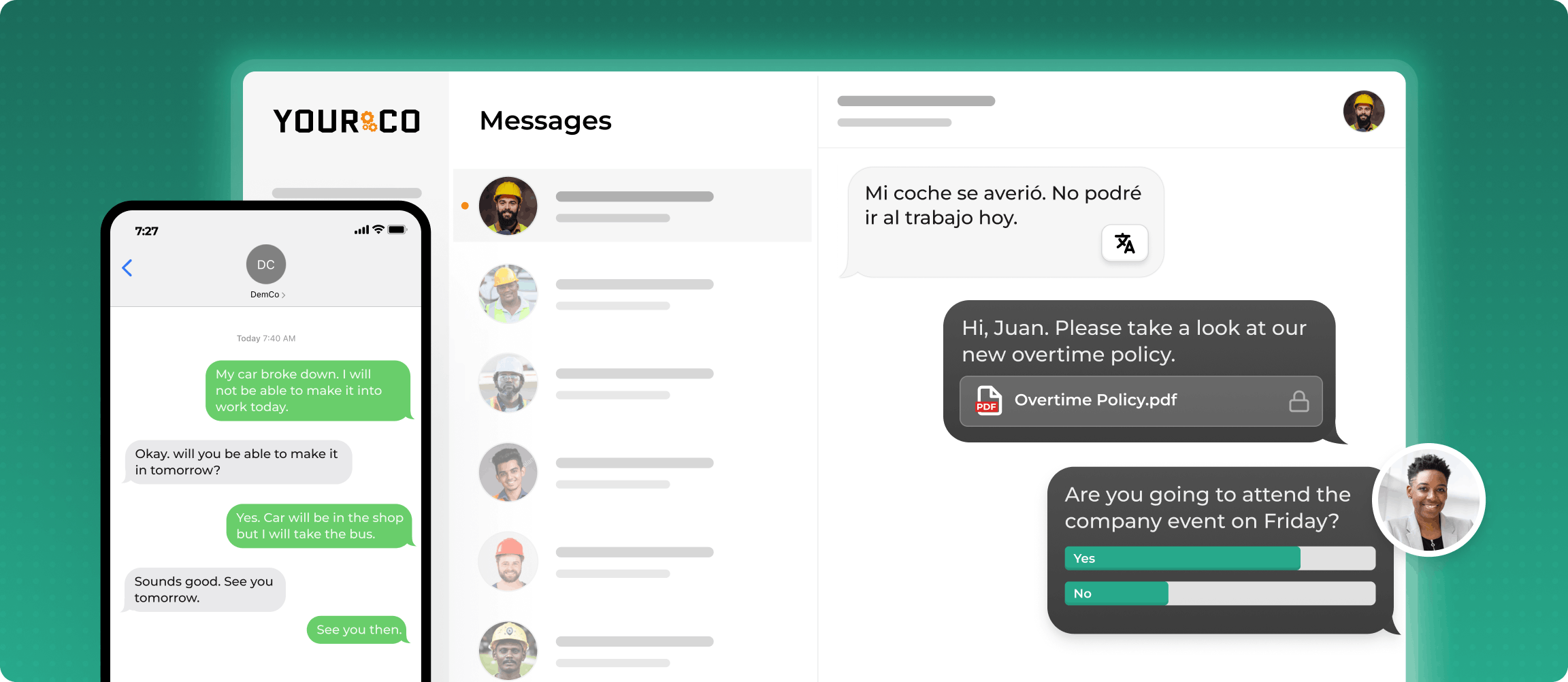Which Applications are Safe to Use for Business-Related Communication?


Clear employee communication helps employees succeed while keeping your organization running smoothly. This includes everything from company newsletters and internal communication updates to employee feedback and peer recognition. Many companies are turning to employee communication apps, but most weren't built with non-desk workers in mind.
Frontline employees face different challenges than office workers. They move between job sites, often work without reliable internet, and may not have company-issued devices. When your team is spread across shifts, locations, and varying levels of tech access, choosing the right communication tool becomes critical for safety, productivity, and keeping everyone connected.
What Is the Most Popular Communication Tool?
The most popular communication tool in the world is texting, with over 5 billion active global users. According to TrueList, 63% of cellphone users prefer texting over free messaging apps.
Why does texting continue to beat out communication apps? The ability to text comes built-in to phones. Users don't have to download an app or create an extra account with another password to keep track of. Starting a conversation through text is as easy as making a phone call—even easier for those who prefer responding on their own time.
For communicating with non-desk employees, texting works especially well because:
- Texting works in more areas than apps do. Even with spotty service at a remote worksite, you can still send and receive important updates.
- Texting costs employees nothing. When employees use their personal devices for work communication, they pay nothing; employers absorb all costs.
- Texting respects privacy. Apps track user behavior, which can feel invasive for many users, especially when the app is associated with an employer.
Texting works because it's on every phone. No matter what device your employees carry—from the latest smartphone to a basic flip phone—they can receive and send text messages. This universal access makes SMS ideal for reaching teams across different locations, especially in industries where internet connectivity is spotty or unreliable.
For companies with multilingual workforces, SMS becomes even more powerful when combined with automatic translation capabilities, ensuring safety alerts, schedule changes, and company updates reach every employee in their preferred language without delay.
Why Texting Beats Other Forms of Business Communication
When it comes to reaching your employees, the best form of business communication is the kind they use. For non-desk employees, this method is texting. How does texting compare to other types of employee communication? Here's what matters:
Email Works Best With Internet Access
Email works well for sharing updates and documents with coworkers in an office setting. However, email use drops off when communicating with non-desk employees. Email requires significant cellular data to load and needs a login and password, so it's not always accessible at different job sites. This lack of access can lead to miscommunication, decreased productivity, and even safety risks in industries where timely information is critical.
Email messages can also feel formal compared to other methods of communication. Email communications suffer from open rates around 15-20%, while 98% of text messages get read.
Extra Apps May Feel Invasive
Communication software like Slack helps with work-related communications, but non-desk employees are often hesitant to use them. A survey reported in Forbes found that 91% of respondents have a negative reaction to being forced to install an app on their phone.
When dealing with consumers, forcing people to download an app can result in lost sales. In the workplace, forcing employees to download an unwanted app can lead to a breakdown in communication that impacts performance and safety. In contrast, texting doesn't require an app—the feature is ready to go as soon as the device works.
Texts Arrive Fast and Work on Any Phone
Text messaging is a great way to reach your non-desk employees, but without the right platform, this method can become difficult to manage on the admin side. Free apps for employee communication often run into this same problem. While they can help with communication, they're not always easy to manage.
For non-desk workers, solutions that use SMS or require minimal data are ideal. WhatsApp and Signal are popular instant messaging apps that offer end-to-end encryption, but they still require a smartphone and internet access.
SMS-based solutions like Yourco provide a better alternative for non-desk employees. These platforms allow communication via regular text messages without the need for internet connectivity or app downloads. This ensures that all employees can receive important updates instantly, regardless of their device or location.
Why WhatsApp Isn't Ideal for Work Communications
While WhatsApp is widely used for personal messaging, it presents significant challenges for business communications that make it unsuitable for professional workplace environments. Recent industry analysis reveals several critical drawbacks that organizations should consider before using WhatsApp for employee communications.
First, WhatsApp lacks enterprise-grade security controls necessary for business environments. Security researchers have identified five major vulnerability categories in WhatsApp's latest releases, including critical issues that enable bypass of network protections and unauthorized access to internal files. Unlike purpose-built business platforms, WhatsApp cannot provide the administrative oversight, audit trails, or compliance features required by many industries.
Second, regulatory enforcement has made WhatsApp usage a costly risk for businesses. The SEC has imposed over $3.5 billion in fines on financial institutions for using WhatsApp for business communications, with individual penalties ranging from $7.5 million to $200 million. These enforcement actions demonstrate that using consumer messaging apps for business purposes violates recordkeeping requirements and creates substantial legal liability.
Additionally, WhatsApp blurs the boundaries between personal and professional communication, creating workplace issues. Over 48% of employees report discomfort using personal messaging apps for work-related communications due to privacy concerns and the expectation of constant availability. This mixing of personal and professional communications can lead to productivity issues and employee dissatisfaction while creating potential data security risks when business information is shared in personal contexts.
Ensure Safe Business Communication Applications
The best communication platforms for business have safety features in place for users, in addition to data. According to the National Sexual Violence Resource Center, 38% of women and 14% of men report experiencing sexual harassment at work. Sexually explicit emails and texts contribute to these cases.
To help combat inappropriate behavior, the right platform keeps your employees' contact information private from other team members—even when sending out mass texts. When you send an all-employee message or a group message, it shouldn't create a group chat on the employee's end. This approach works for two reasons:
- If the employee replies, it's not a reply-all; the message goes only to the appropriate admins and managers.
- Companies and their employees don't want personal cell phone numbers shared with each other. This privacy feature protects employee information and helps avoid any sort of harassment.
A proper business communication platform offers enterprise-grade security to keep customer data safe and secure. Key safeguards should include:
- Dedicated company numbers controlled by admins
- Secure file sending with phone-number verification and PIN access
- Automatic revocation of file access when an employee is terminated
- Data encryption at-rest and in-transit
- Multi-tenant database separated on a per-client basis
- Strong authentication for enhanced security
Connect With Your Non-Desk Teams Using Yourco
The most effective way to reach your entire workforce is simple: use the communication method they already have and trust. Yourco makes reaching out to frontline employees effortless with plain-text SMS that works on any phone, including basic flip phones. No apps, downloads, or Wi-Fi required.
You send messages once, and Yourco delivers them instantly to your entire team with automatic translations in over 135 languages, so nothing gets lost. When employees reply, the system captures every response, timestamps conversations, and routes replies to the right managers—never creating messy group chats that compromise privacy.
Two-way communication enables real-time feedback collection through polls and surveys, while enterprise-grade security keeps employee contact information private and protected. Integration with 240+ HR systems means your employee directory stays current automatically.
Unlike consumer messaging apps that create compliance risks and privacy concerns, Yourco provides dedicated company numbers, audit trails, and enterprise controls designed specifically for workplace communication. The platform identifies attendance patterns, tracks message delivery, and generates reports, helping you spot communication gaps before they become operational problems.
Clear communication policies remain essential for workplace effectiveness. While SMS makes reaching employees easier, your organization should maintain guidelines around response expectations and appropriate use to ensure the system supports productivity without creating always-on workplace pressure.
Try Yourco for free today or schedule a demo and see the difference the right workplace communication solution can make in your company.
Frequently Asked Questions
What makes texting a more effective communication tool for non-desk employees compared to email and apps?
Texting is more effective because it requires no internet access, app downloads, or logins—critical for workers in environments with limited connectivity. SMS ensures important updates reach employees instantly. Unlike apps that require technical setup and data usage, texting works universally on any phone and provides a direct, informal communication channel that encourages quicker responses from non-desk workers.
How is Yourco better than messaging apps like WhatsApp for business communication?
Yourco provides enterprise-grade security with dedicated company numbers, data encryption at rest and in transit, and passwordless authentication. Unlike consumer apps, Yourco keeps employee contact information private, ensures replies go only to appropriate managers (not the entire group), and automatically revokes file access when employees leave. The platform includes audit trails, compliance features, and administrative oversight that consumer messaging apps lack, eliminating the legal risks and privacy vulnerabilities associated with apps like WhatsApp.
Can Yourco help me reach employees who prefer receiving messages in Spanish?
Yes, Yourco automatically translates messages into Spanish and 135+ other languages and dialects based on each employee's preferred language setting. When you send a message in English, Spanish-speaking employees receive it instantly in Spanish without any additional steps from you. This eliminates miscommunications that could affect productivity and safety while creating a more inclusive workplace where employees feel valued, receiving communications in their native language. You can send unified messages across your entire workforce without manual translation work, saving time and ensuring all critical updates reach every employee clearly.
How is Yourco different from group texting?
Yourco sends mass messages as individual communications from the company to each employee, so workers never see each other's contact information. When employees reply, responses go directly to designated managers or administrators—not to the entire group. This structure protects personal phone numbers, prevents inappropriate exchanges or harassment, and maintains privacy while enabling efficient mass communication and two-way feedback.




